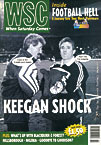 Are players from abroad really good value for money?
Are players from abroad really good value for money?
Just the other week someone phoned up claiming to be Frankie Dettori (“you know, off the telly”) and offering a dead cert tip for the 3.30 at Wincanton. With not a moment to lose we raced out with the petty cash tin and emptied it into the hands of the nearest bookies on a horse that, wouldn’t you know it, strolled in last. So you can appreciate that we felt for Graeme Souness a few weeks back when it was revealed that the ‘George Weah’ who phoned him up to recommend Aly Dia, a Senegalese player who played for Southampton against Leeds in mid-December, was in fact Dia’s agent, and that the player had been previously hawked around several lower division clubs.
Graeme had never met George Weah but had heard him speak on television and thought the voice on the phone sounded about right. “I don’t feel I have been duped in the slightest because that’s the way the world is these days,” he said, crimson but defiant.
Even accepting that managers are accustomed to conducting transfer business over the phone and will often need to bring players in at short notice, this was spectacular stuff, and a fine example of the haphazard way in which English clubs have set about importing players from overseas. There are more foreign footballers on the books of League clubs than ever before – from international names lured to the Premiership by whopping salaries to free transfers from Scandinavia and Holland in the lower divisions – and already, at the halfway stage in the season, they seem to be coming under increasingly frequent attack in the tabloids, scapegoats for their clubs’ poor form. With every new setback for West Ham or Middlesbrough, for example, we get to hear more about the ‘footballing mercenaries’ from overseas who have come over here for the money and have no sense of loyalty to the club which pays their wages, as though English players are any different.
The buying of certain players simply looks like bad judgment. After witnessing Florin Raducioiu and Mikkel Beck struggling to remain on their feet during the relatively sedate group matches of Euro 96, who would have backed them to make an impact in the hundred-mile-an-hour frenzy of the Premiership? Apart, that is, from Bryan Robson and Harry Redknapp, who seem to have assembled their current squads with all the reasoned analysis of a kid organizing a composite Subbuteo team.
And is the rate of success when it comes to buying foreigners any lower than clubs buying home grown players? Poborsky and Cruyff have not been a success at Old Trafford, but then neither were Gary Birtles or Peter Davenport. Pundits may point to the disruptive effect that Emerson has had on the Middlesbrough dressing room, yet Rodney Marsh hardly proved a great catalyst for Manchester City and we are forever being told how wonderful he was (not least by Rodney himself).
Many clubs can hardly be said to be getting good value for the millions they have forked out in transfer fees and wages, but that is hardly news: it has been proved time and again over the years that clubs who spend the most don’t always do the best. Otherwise Ron Atkinson would be the English game’s most successful manager, rather than Bob Paisley. The Sky money is there to be spent of course, but, as at least one foreign player, Fabrizio Ravanelli, has suggested, it might be more effectively used on improving training and medical facilities.
Sadly, the attitude towards foreign players in English football has always been pitched somewhere between the saloon bar and the eugenics debates of Victorian times, when then was widespread belief in scientific ‘proof’ that some races were simply inferior to others. The tendency to deal in generalized notions about national ‘characteristics’ still seems to be a stumbling block for pundits trying to assess overseas players – it’s not that long ago, remember, that Bobby Robson was picking black players for the England team because of their “natural flair” – though it can also provide a useful fallback position when things go wrong (and managers publicly berate themselves for putting their trust in ‘temperamental’ types).
As we’ll doubtless see during the rest of this season, the press do take an odd glee in the failure of foreign players. Like tutting OAPs who warned that no good would come of mixed marriages, they can’t wait to see themselves vindicated. Perhaps this is because if the large majority of foreign players were successful here it would somehow undermine English notions of our unique football culture. It would mean that we aren’t as different as we like to think, even that we are quite like… them, which would, of course lead to a fallout of Biblical proportions. Anyway, have to go, it’s Frankie again, all apologetic and this time he’s got a dead cert.
From WSC 120 February 1997. What was happening this month